Bass King, Stillwater, Minn. The Bass King, almost always found in red and white, was made by the National Bait Co. around 1926. They can be found in two sizes, and features an unusual and well-made body with long flutes cut into the sides. |
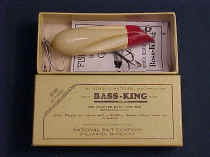 |
Little Bass King, Stillwater, Minn. The Little Bass King is the baby size of the lure mentioned above. It also dates to 1926. Its slogan on the box mentions a "metal core" in addition to the fluted wooden body, so there is no telling what's inside this plug. |
|
Biek Bait Co., Dowagiac, Michigan There is little background on the Biek Bait Co. but we know it was in business in the 1930s and 40s in Dowagiac, in the shadow of the Heddon tackle empire. This folky lure has two belly weights and well-machined cup hardware. The endflap is stamped Biek Bait, Dowagiac, Mich. These have been mistaken for Bud Stewart lures in the past. |
|
|
Biff Bait Company, Milwaukee Biff Bait Co. lures are great. Each of the half-dozen lure-specific boxes has its own jingle. The inventor, Al Bayer, must have been a witty, literate soul. This Musky Spiral, made around 1920, comes in an 8-inch-long picture box!
|
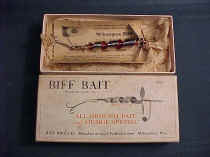 |
Biff Bass Spiral, College Edition This relatively common picture box has my favorite of the half-dozen "Biff" slogans that appear on these wonderful boxes. "Will Fool the College Bred Fish" was a grand claim designed, most likely, to entice the educated anglers.
|
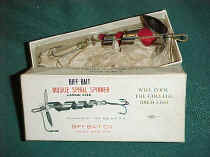 |
|
Biff Bait Company, "Master Biff" This is the most popular of the Biff Baits, with the slogan "Biff Goes That Sassy Bassy Bait." Notice the color of the lure is actually part of the boxtop design. Most boxes have a color stamped on the endflap. |
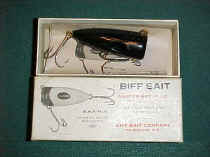 |
Bill's Pride, William Miles, N.Y. This wooden Bill's Pride bait from the 1920s was made by William C. Miles of Park Row, New York, N.Y. With no eyes and a simple design, this bait featured a leather double tail and a steel bar inserted into a slot in the belly. The joints were attached through eyelets and the whole contraption has only a single hook. The paperwork is awesome! |
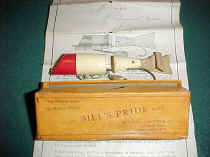 |
|
Big State Bait Company, Texas The Survivor, as this bait was called, is an apparent forerunner of the Bleeding Bait Co. This glass-eyed lure has a trap door in its belly for inserting blood tablets. This lure is from the 1930s and is quite rare. Little is known about the Survivor or Big State Bait Co. of Texas. |
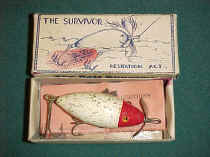 |
|
Bleeding Bait Manufacturing Co., Texas Made in the late 1930s through the 1940s, these Bleeding Bait Co. wooden lures had painted eyes and included a glass tube full of the secret blood tablets designed to get the fish quite agitated. These tablets often stained the boxes and paper flyers inside. Bleeders are neat! See the lure one frame above! |
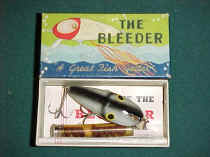 |
|
The Bleeder, Dallas, Texas This green box is a few years earlier than the more common example shown above. The lure is called the "Ranger" and the hooks have the Bleeding Bait company's unique nickel-plated weedless hook guards. I wonder if a fish could get hooked biting through those things! This box dates to 1938 or 1939. |
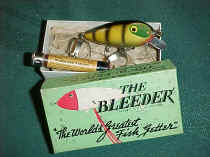 |
Glitter Bottom Bleeder, Tulsa, Okla. This is the rarest of the five known Bleeder boxes. Made in the late 1930s by National Tackle Co. of Tulsa, Okla., this blue box is newer than The Survivor pictured three above, but older than other lures shown here. The "Glitter Bottom" lure has the unique "boat shaped" tablet compartment that protrudes from the belly. Others have a hole inside the lure. |
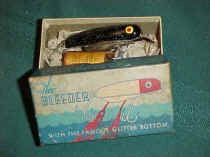 |
River Flash Non-Bleeder, Okla. This is the very rare "non-bleeding" bleeder lure by National Tackle Co. of Tulsa. It is called the River Flash and is the same as the "Glitter Bottom" above except it has a plate covering the blood tablet receptacle. This special box has papers and, although not needed, a glass bottle of blood tablets. Note the unique weedless hook guards. |
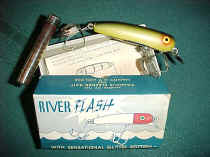 |
Bubble Minnie, Detroit The Bubble Minnie, circa1940s, features a nicely blued aluminum frame with wooden "barrels" that fit inside the cavity. The barrels were filled with bicarbonate of soda and emitted a noisy trail of fizz and bubbles. This unused Bubble Minnie was owned by noted Florida outdoor writer Ed McLaurin, who accumulated many unusual lures sent to him by manufacturers seeking publicity. |
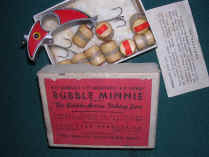 |
Bubble Minnie, Fair Play Industries This later version Bubble Minnie has one plastic insert (instead of two seen above) and the body is stainless steel, not aluminum. Instead of wooden barrels the cavity has a reusable plastic compartment into which the fizz powder could be poured. The manufacturer was Fair Play Industries in Detroit. This version dates to the 1950s. |
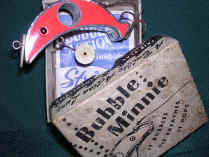 |